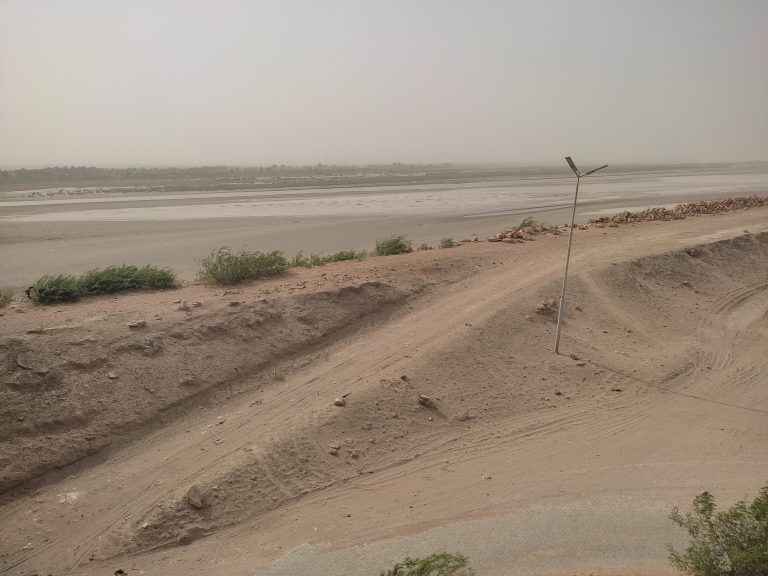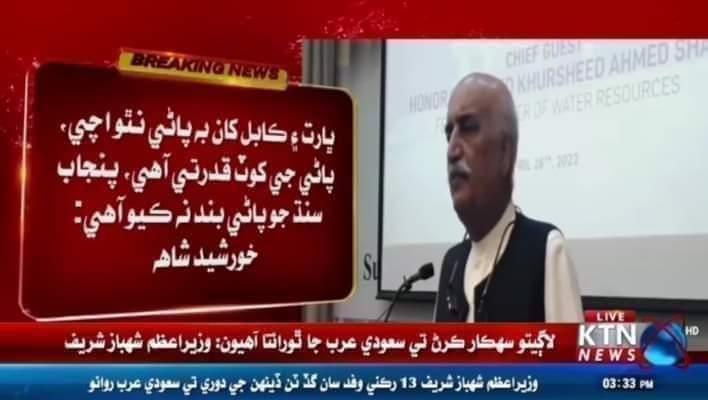
Federal ministry of water and power is playing the role of silent spectator while Indus River System Authority continues violating the 1991 Water Accord depriving Sindh of its due share in Indus River water.
Sindh Courier Report
Karachi
Sindh Irrigation Minister Jam Khan Shoro boycotted on Friday the meeting of National Assembly’s Standing Committee on Water Resources as a protest against the committee’s indifference towards Sindh’s water woes.
An official handout issued here said that Jam Khan Shoro boycotted the ongoing meeting as the Standing Committee had taken no decision with regard to illegal release of water through the canals between Taunsa and Guddu Barrage.
Sindh Irrigation Minister contended that 20000 Cusecs water disappears between Taunsa and Guddu Barrage resulting in acute shortage of water in Sindh but the Standing Committee took no remedial measures despite the fact that Sindh had proved during previous meeting of Standing Committee that the water share of Sindh disappears between the Taunsa and Guddu Barrage.
Watch Video: This is not the desert but a river once called Mighty Indus
Provincial Minister lamented that the federal ministry of water and power is playing the role of silent spectator while Indus River System Authority (IRSA) continues violating the 1991 Water Accord depriving Sindh of its due share in Indus River water, which is unfair.
A few days back, on June 1, Minister Jam Khan had sent a letter to IRSA showing serious reservations on its unfair water sharing policy. In his letter, he stated that during the month of April, Punjab received 34 percent less water while it was 42 percent short in Sindh. “Currently, Sindh faces 47 percent shortage while it’s only 32 percent in Punjab”, Jam Khan mentioned in the letter.
The Provincial Irrigation Minister said that owing to unfair water distribution by IRSA in violation of Water Accord, the drought-like situation has emerged in Sindh and the entire agriculture sector has adversely been affected as the standing crops are drying up due to no water in River Indus.
It is pertinent to mention that besides the Irrigation Minister, some other provincial ministers had been issuing statements at different times, and even Sindh Chief Minister Syed Murad Ali Shah had raised the issue in a press conference to draw the attention of the federal government towards diverting the Indus River water illegally through Chashma-Jehlum and Taunsa-Punjnad link canals and the shortage of water in Sindh.
Also read: Sindh Minster accuses Balochistan member of helping Punjab in water theft
Sindh Irrigation Minister Jam Khan Shoro had in a statement also alleged the Balochistan’s representative in IRSA of supporting the Punjab when the IRSA held voting on diverting the water through link canals, in violation of constitutional requirements.
The illegal water releases in Punjab resulting in water shortage in Sindh is not a new issue as illegal practice continues for decades. A similar situation had been observed during the PTI government when the Sindh ministers had to convene press conferences at the dried bed of Indus River near Jamshoro to highlight the issue.

It is also pertinent to note that Pakistan People’s Party is in power in Sindh, and its own senior and influential leader Syed Khurshid Ahmed Shah holds the portfolio of Water and Power in the Center. Surprisingly, Shah has publicly denied that Punjab was stealing the water and termed the water shortage in Indus River as ‘natural’.
Link Canals
The Chashma-Jehlum and Taunsa-Punjnad link canals were built to divert the Indus water to Punjab after the Government of Pakistan sold its two rivers to India under the World Bank-brokered Indus Basin Water Treaty. The funds so received for selling the rivers, were utilized for constructing the barrages, link canals and the Tarbela Dam on Indus and Mangla Dam on Jehlum River besides installing tube wells in Punjab. The Treaty was signed by President Gen. Ayub Khan and Indian Prime Minister Jawahar Lal Nehru on September 19, 1960 in Karachi.
Sindh had raised objections at the very outset on construction of link canals but was told that the link canals would be used only during the flood seasons.
Protest rallies in Sindh
Meanwhile, various political and other organizations are staging demonstrations and taking out rallies against, what they allege theft of water by the Punjab through link canals.
Awami Tehreek of Ayaz Latif Palijo, Sindh United Party of Syed Jalal Mahmood Shah, Sindhi Porhyat Sangat, the labor wing of Jeay Sindh Qaumi Mahaz, and other organizations and the growers have been staging demonstrations and rallies in different towns of the province.
Moreover, citizens of Thatta staged sit-in at the national highway and blocked the road demanding equal distribution of river water.
Meanwhile, Sindh Human Rights Group had announced staging the demonstration in New York.
Sindh United Party’s President Syed Zain Shah also issued a statement, condemned the attitude of IRSA, and demanded immediate removal of its chairman. According to him, Sindh is faced with 72 percent shortage of water and termed it a well-hatched conspiracy to destroy the economy of the province.
Zain Shah said that not only the agriculture sector has been destroyed, but water is not available even for drinking purposes.
_________________